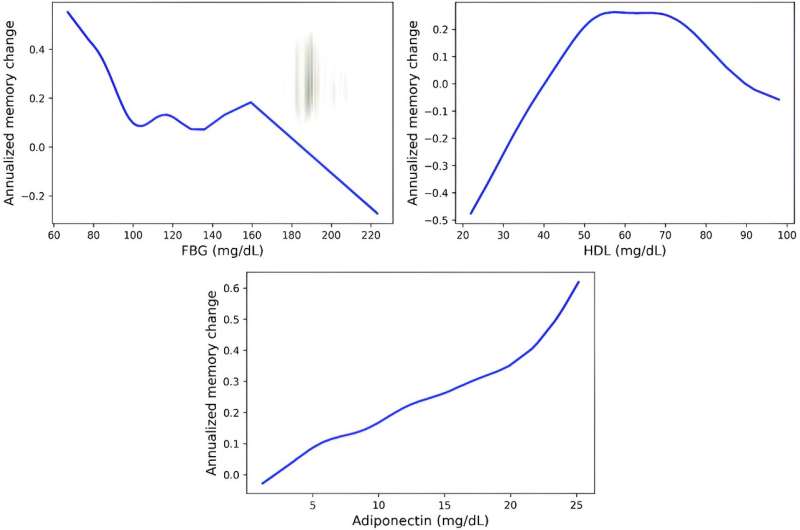This article has been reviewed according to Science X's editorial process and policies. Editors have highlighted the following attributes while ensuring the content's credibility:
fact-checked
trusted source
proofread
Sex-specific blood biomarkers linked to memory changes in middle-aged adults: The Framingham heart study

Dementia refers to a set of symptoms marked by a decline in cognitive abilities, including memory, language, reasoning and everyday tasks. It can result from various causes, such as Alzheimer's disease, vascular problems, traumatic brain injuries and other health issues.
While age is the most significant risk factor, it is widely believed that women face a higher risk for dementia. Although both men and women experience cognitive changes with age, crucial differences exist in the biological mechanisms that underlie cognitive decline between the sexes.
In a new study from Boston University Chobanian & Avedisian School of Medicine and School of Public Health, researchers have identified certain blood markers—specifically lower plasma levels of adiponectin (a hormone released by fat tissue) and higher fasting blood glucose levels—that are linked to faster memory decline during middle age.
Specifically, two markers, higher HbA1c and plasma insulin levels, were significantly associated with a faster memory decline over time in women but not in men.
"Besides life expectancy, the gender disparity in dementia may also be influenced by multiple factors, such as socioeconomic risk factors, inflammation, reproductive markers and the amyloid β protein42 (Aβ42)."
"Therefore, it is critical to explore blood biomarkers that may have differing associations with cognitive changes between men and women to understand the underlying mechanisms of dementia better and develop effective interventions," explained co-corresponding author Huitong Ding, Ph.D., Postdoctoral Associate at Boston University Chobanian & Avedisian School of Medicine.
Using the data from the Framingham Heart Study (FHS), the researchers conducted analysis on several blood markers and their relationships with memory and other cognition changes in 793 middle-aged participants. They then used several statistical methods to study the relationships.
According to the researchers, this research is the first sex-specific analyses of blood biomarkers related to midlife memory change in a prospective cohort study.
"Our findings highlight the importance of targeting cardio-metabolic risks and the need to validate midlife specific biomarkers that can accelerate the development of primary preventive strategies," added Chunyu Liu, Ph.D., professor of biostatistics at Boston University School of Public Health and co-corresponding author.
The researchers hope their study will lead to the development of targeted cognitive preventive strategies by addressing cardio-metabolic risks related to memory changes in middle age. These strategies, they believe, could prevent cognitive decline and, therefore, enhance lifelong health and well-being for all individuals.
The paper is published in the journal Alzheimer's & Dementia: Diagnosis, Assessment & Disease Monitoring.
More information: Huitong Ding et al, Sex‐specific blood biomarkers linked to memory changes in middle‐aged adults: The Framingham Heart Study, Alzheimer's & Dementia: Diagnosis, Assessment & Disease Monitoring (2024). DOI: 10.1002/dad2.12569




















